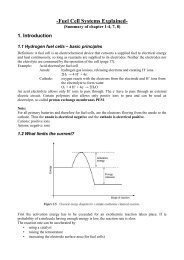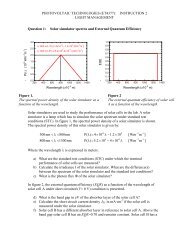Fuel Cell Systems Explained - from and for SET students
Fuel Cell Systems Explained - from and for SET students
Fuel Cell Systems Explained - from and for SET students
You also want an ePaper? Increase the reach of your titles
YUMPU automatically turns print PDFs into web optimized ePapers that Google loves.
to the HHV or LHV. If the in<strong>for</strong>mation is not given, probably the the LHV is used.Table 2.2 shows the theoretical efficiency limit of a hydrogen fuel cell in respect of the operatingtemperature. However in practice there are some differences. Voltage losses are less at higher temperatures, so the fuel cell voltage is higher at hightemperatures. Waste heat of higher temperature cells can be used. <strong>Fuel</strong> cells do not always have a higher efficiency limit than heat engines.The mentioned decline in maximum possible efficiency with temperature <strong>for</strong> the hydrogen fuel cellis not exactly occur <strong>for</strong> other cell types.2.4 Efficiency <strong>and</strong> the fuel cell voltageThe operation voltage of a fuel cell can be related to its efficiency.For 100% efficient hydrogen fuel cell, the enthalpy of <strong>for</strong>mation is converted into electric energy.Considering the fact that not all fuel is used during operation, the fuel utilisation coefficient isintroduced.This is equivalent to the ratio of fuel cell current <strong>and</strong> the current that would be obtained if all thefuel were reacted. The fuel cell efficiency in respect to the HHV is there<strong>for</strong>e given byA good estimation <strong>for</strong> µ f is 0.95.






